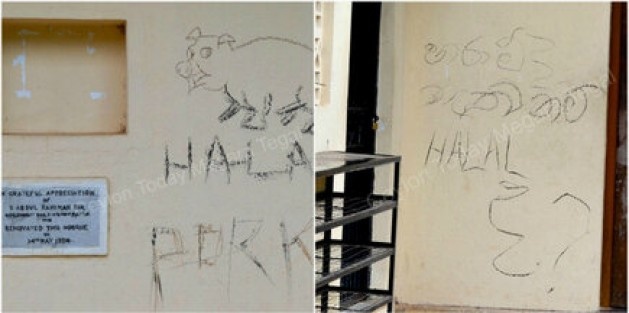 |
| Anti-Muslim graffiti sprayed on a mosque earlier this year. |
Moulavi Fazil Farooq, from the Islamic political group All Ceylon Jamiyyathul Ulama, told me that Muslims’ “freedom of religion and freedom of speech” are under threat in Sri Lanka. He also sent me in the direction of one of the Buddhist groups that have been accused of carrying out the attacks: Bodu Bala Sena, which roughly translates as “Buddhist Power Force.” Their stated aim is to “protect” Buddhist culture in Sri Lanka, as it’s apparently under threat from Muslim and Christian groups. (For context, 70 percent of Sri Lanka’s population is Buddhist—less than 10 percent is Muslim, fewer still are Christian.)
Unsurprisingly, Dilanthe Withinage, the CEO of Bodu Bala Sena, denies that his organization had any involvement with the violence. But then he does seem to think the whole thing has been blown wildly out of proportion: “Last night I was at a place outside of Colombo and almost 80 percent of the people there were Muslims,” he told me over the phone. “They were actually playing and eating—I don’t think there is a big issue.”
So there you go. As long as Muslims can relax and feed themselves in Sri Lanka without impunity, they shouldn’t kick up a fuss about taking the occasional piece of pork or clenched fist to the face.
As for the ban on the Halal logo, an obvious barrier to the religious freedom of Muslims in the country, Withinage considered Halal as something “that Muslims should enjoy,” but also kindly pointed out that, “Halal is used by Muslim organizations to promote Islam; to promote Muslim fundamentalism.”
“The media can try to promote the violence, and there are some incidents, but I don’t think that there is a big conflict between Muslims and community Buddhists in Sri Lanka.”
I guess it’s easy enough to downplay religious persecution when you’re not on the receiving end of it. As part of my research for this article, I was forwarded a list of more than 130 recorded Islamophobic incidents. These range from the attempted kidnapping of Muslim businessmen, to the displaying of pigs’ heads outside Muslim houses, to direct calls for violence from Bodu Bala Sena themselves.
The man that sent me the details is Jehan Perera, director of the National Council for Peace of Sri Lanka, an NGO that aims to stop division between Sri Lankan communities and ensure rights for all.
His views on tensions between Muslims and Buddhists in Sri Lanka were very different to those expressed by Withinage: “Muslims are scared because they think they might be the next target of the Buddhists. They are all worried. They all feel that this might suddenly get out of control, which it could.”
It is important to note that this isn’t entirely a one-way street. Perera told me that when one particular mosque was attacked, “the Muslims fought back in that area… they were large in numbers.”
So what is actually causing the violence? Bypassing the obvious point that these acts of aggression seem to go against Buddhist ideals, what is the real underlying reason for this new wave of unease in the country?
Some claim that it may be due to economic frustration, with prosperous Muslims providing a convenient “scapegoat for the frustrated aspirations” of those who feel they maybe aren’t quite as wealthy as they deserve to be.
However, Perera cites the potent nationalism that has been instilled in the majority Sinhalese population since the Tamil Tigers were crushed in a bloody civil war that ended in 2003 and killed 100,000: “The latest attack on a Muslim mosque in Colombo is a further sign that the Buddhist nationalist upsurge is continuing to grow, and not diminish, with the passing of time.” Perera then explained, “Sri Lanka, in the Buddhist mind, is a Buddhist country, and to win the war, the government mobilized this nationalism. The government has been exploiting that for its own purposes.”
Perhaps this is why the police seem to have done so little to stop the violence spreading. “In a way, having religious tension which pits Buddhists against Muslims serves the government,” says Perera. “The government don’t have to do much at all to keep the Buddhists united behind them.”
The real worry is that events in Sri Lanka may start to mirror those seen in Burma, where both Rohingya Muslims and Buddhists have been killed, violence has escalated to the use of explosives and entire Islamic communities are being forced to move on a mass scale, sometimes fleeing in boats and taking their chances out at sea. Justin Wintle, an author and historian, claims that “Islamic fundamentalists, friends of al Qaeda, are starting to get interested” in the area, something which, presumably, neither the government of Burma or Burmese Buddhists are too keen on.
“In Burma, the very citizenship of Rohingyas is being disputed,” Meenakshi Ganguly from Human Rights Watch told me. “They are regarded as outsiders.”
Given that Muslims in Sri Lanka have a much more secure presence than those in Burma, it seems unlikely that their citizenship will come into question. However, it is still an unsettling prospect as anti-Muslim propaganda in Sri Lanka gains more support. According to documents I received from Jehan Perera, some are calling for Muslims to leave certain areas of the country altogether.
“Sri Lanka,” Ganguly continued, “has suffered decades of violence, with enormous casualties.”
It would be a tragedy if the Muslims of Sri Lanka, already one of the most abused populations in one of the bloodiest countries of the late 20th century, were plunged back into the sort of violence that they’ve just emerged from. If the Sri Lankan government doesn’t start taking a harder line on these sectarian conflicts, we could see the country turning the clock back on the few years of peace and relative stability that it has achieved.
vice